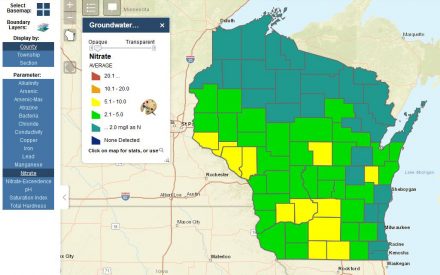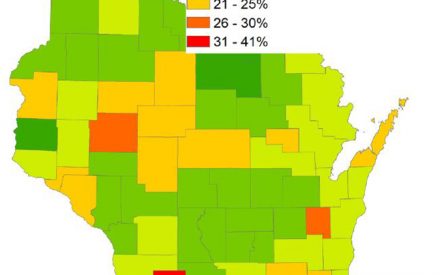Wisconsin dairy farms produce the equivalent of 12 billion gallons of dairy manure every year. Properly managed, this manure is a valuable source of crop nutrients. However, improperly managed manure can release nitrogen, phosphorus, and pathogens into surface water and drinking water supplies. Every year, seven billion gallons of manure are transported and/or applied by 185 small-business manure applicators. Extension’s assessments and surveys have shown that their frontline employees need basic information on how to implement manure regulations, safety protocols, and spill prevention. Crew supervisors and business owners need more advanced, research-based information to guide and supervise employees.
In response, Extension supports these firms’ frontline employees, crew supervisors, business owners and farmers spreading their own manure through creating educational programs and conducting outreach at major trade events, applying research for guidance and solutions, and leveraging industry partnerships.
Professional Education & Trade Events
Extension developed and implemented in-person and online training programs for manure applicators and farmers. More than 500 Wisconsin farmers and manure applicators took part in our three-hour training program in the past five years, learning about proper manure application, spill prevention, and successful neighbor relations. Through this training, participants improved their ability to safely and properly apply manure and respond when a spill occurs. After the training, 85% of participants gained skills related to decreasing the risk of manure runoff, and 74% learned how to follow a nutrient management plan. In addition to online and in-person training, Extension offered field days and demonstration events and initiated the North American Manure Expo, a live educational and demonstration event for between 1,000 and 2,000 annual attendees. Extension has hosted the 2012 and 2017 events, and will host again in 2023.
Applied Research
Extension researched the root causes and impact of manure spills, conducting the 3rd five-year study of this kind in 2020–2021. An Extension state specialist and student researchers reviewed all documented 728 manure spills and incidents that occurred in Wisconsin between 2015–2019. The study revealed a key solution to regularly occurring spills at traffic intersections. Manure applicators are now moving the valve switch that releases manure or are making valve opening a two-step process. This prevents common incidents that occur when drivers downshift as they come up at an intersection.
Industry Partnerships
Extension partners with several insurance carriers to create a market-based incentive program that blends better management, equipment inspections, and risk reduction with significant insurance premium discounts for farmers and for-hire manure applicators. In exchange for employee training and documentation, participating companies will reduce insurance premiums 7–10%. If the participant wishes to earn higher discounts (up to 38% on general liability and 50% on environmental pollution), they can implement additional risk-reduction strategies, take additional training, and participate in a third-party audit. Average annual savings nationwide for manure application professionals are estimated at $100,000. Premium savings ranged from $500 to more than $11,500 annually.
Extension helps for-hire manure applicators and farmers in minimizing the impact of accidental manure spills and manure runoff. This reduces manure’s impact on both surface water and groundwater.
Conservation professional training is part of Extension’s Natural Resources Institute. Learn more by visiting conservationprotraining.org.
Download Article

 Ensuring Safe Drinking Water for Rural Wisconsin
Ensuring Safe Drinking Water for Rural Wisconsin Well Contamination in Southwest Wisconsin
Well Contamination in Southwest Wisconsin An Improved Geologic Map of Wisconsin
An Improved Geologic Map of Wisconsin Innovating Local Government by Developing Leaders
Innovating Local Government by Developing Leaders


